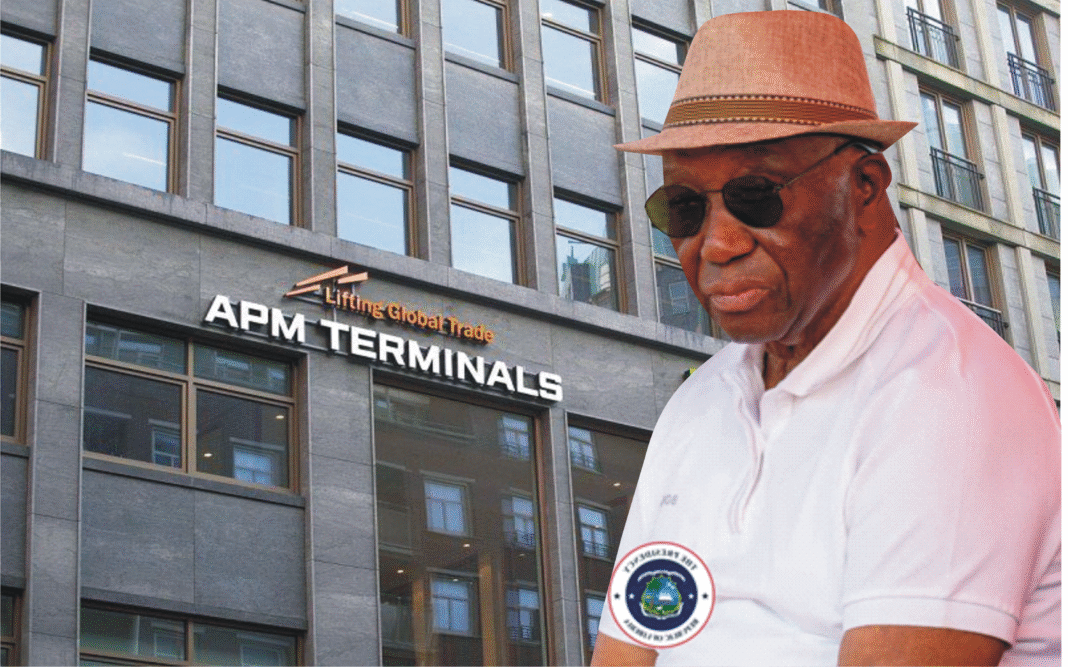Maersk company APM Terminals’ port contract in the Liberian capital of Monrovia is still eleven years away from expiring. But frustration with the company in the West African country has grown so strong that the contract, which came to effect in 2011, is now being reviewed.
President Joseph Boakai made the decision after many years of criticism in Liberia of APM Terminals’ operation of the port of Monrovia.
In 2022, Danwatch and Ekstra Bladet, in collaboration with Voice of Liberia, uncovered a revolt among workers at the port. The dockworkers were deeply frustrated after several years of unjustified firings and send-offs, useless health insurance, dust pollution and wage disputes.
In a response to Danwatch, the National Port Authority of Liberia, on behalf of the Liberian government, lists a number of reasons for wanting to renegotiate APM Terminals’ contract.
They mention, among other things, frequent operational disruptions, labor disputes, and price increases.
The National Port Authority (NPA) is leading the negotiations with APM Terminals, which also involve a few other authorities and President Joseph Boakai’s special advisor, Morley P. Kamara.
The NPA expects the negotiations to take a minimum of six months and as a start they have instructed the National Bureau of Concessions (NBC) – a government agency – to prepare a monitoring report on APM Terminals’ preliminary efforts in Liberia.
APM Terminals writes in an email that “they look forward to participating in the dialog on future opportunities to develop the port infrastructure in Liberia.”
In 2022, when Danwatch and Ekstra Bladet uncovered labor rights violations at the port of Monrovia, Liberian MPs warned that APM Terminals could even have its license to operate the port of Monrovia revoked if the company did not improve conditions for its employees.
That scenario is not relevant today, a well-placed source with in-depth knowledge of the case tells Danwatch. But this does not mean that Liberia is particularly satisfied with APM Terminals’ operation of the port of Monrovia.
Sources in the business community, the political system and the general population are all expressing frustration with APM Terminals. The criticism is directed not only at the Maersk company, but also at the government of former President Ellen Johnson Shirleaf, who in 2010 decided to award the concession to APM Terminals.
The National Port Authority has highlighted six specific issues in the port contract to Danwatch that have given rise to renegotiation. In addition to “constant operational disruptions”, “labor disputes” and “regular price increases”, they cite a lack of opportunities to supervise the company, unfair docking protocols and a restriction in the port contract that gives APM Terminals exclusive rights to all services to ships within 30 miles (48.2 kilometers) of the port.
“There are major public protests against APM Terminals’ regular tariff increases under the guise of adjustments for inflation,” the National Port Authority told Danwatch on behalf of the Liberian government.
“There are constant disruptions to port operations due to regular breakdowns of the few reach stackers (vehicles used to transport and lift containers, ed.) available to APM Terminals. There have been cases where truck drivers have demonstrated and stopped work due to APM Terminals’ inadequate loading equipment,” the statement continues.
The recurring operational problems frustrate businessman Dominic Nimley, who imports building materials, electronics and used cars. He also represents the Liberia Business Association (LIBA).
“Technical problems at the port cost Liberian companies money, and ultimately the bill ends up with the ordinary consumer. In this way, APM Terminals’ problems have consequences for the entire Liberian economy,” he says.
APM Terminals has declined to comment on the specific points of criticism from the National Port Authority out of consideration for the ongoing negotiations.
The investigation into APM Terminals fulfills one of President Joseph Boakai’s campaign promises made during the fall 2023 election campaign, explains Aaron Weah, PhD at Ulster University in Northern Ireland and head of the Liberian think tank Ducor Institute for Social & Economic Institute.
“The president campaigned on taking on some of the large international companies in the country that many people are frustrated with and that previous governments awarded contracts that have proven to be disadvantageous to the Liberian economy,” he tells Danwatch.
Earlier this year, Liberia also renegotiated its agreement with one of the world’s largest steel producers ArcelorMittal, which has been mining iron ore in the northeastern corner of Liberia since 2005. Prior to the audit of the APM Terminals, the port authorities landed a revised contract with another major player at the Port of Monrovia, logistics company Global Tracking & Maritime Solutions.
Aaron Weah believes that the renegotiation of APM Terminals’ contract is linked to Liberia’s severe economic problems.
“The government needs money, so it is exploring all options to secure more revenue for the treasury. And because APM Terminals has one of the most valuable government contracts in the country, it is an obvious place to look for opportunities to secure a more attractive deal,” he says.
- Danwatch


